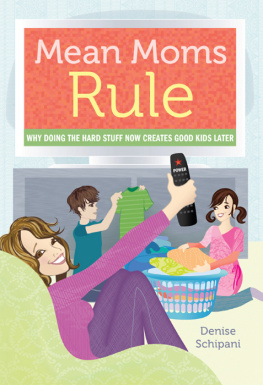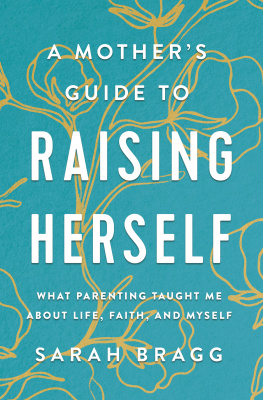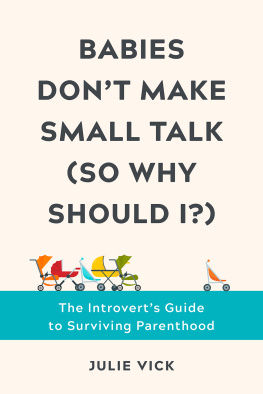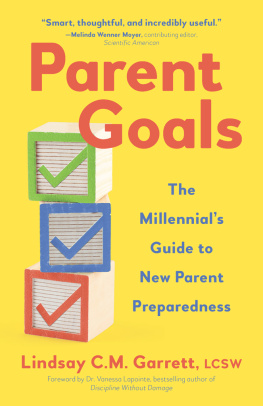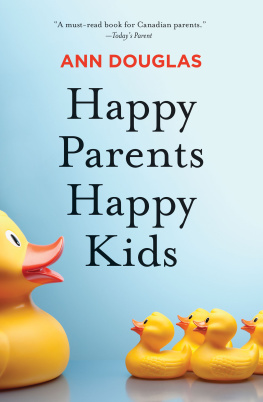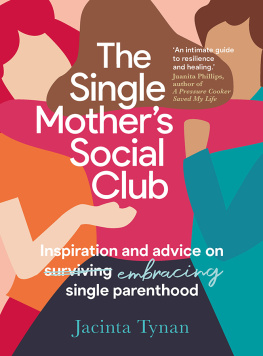Contents
Guide
Page List
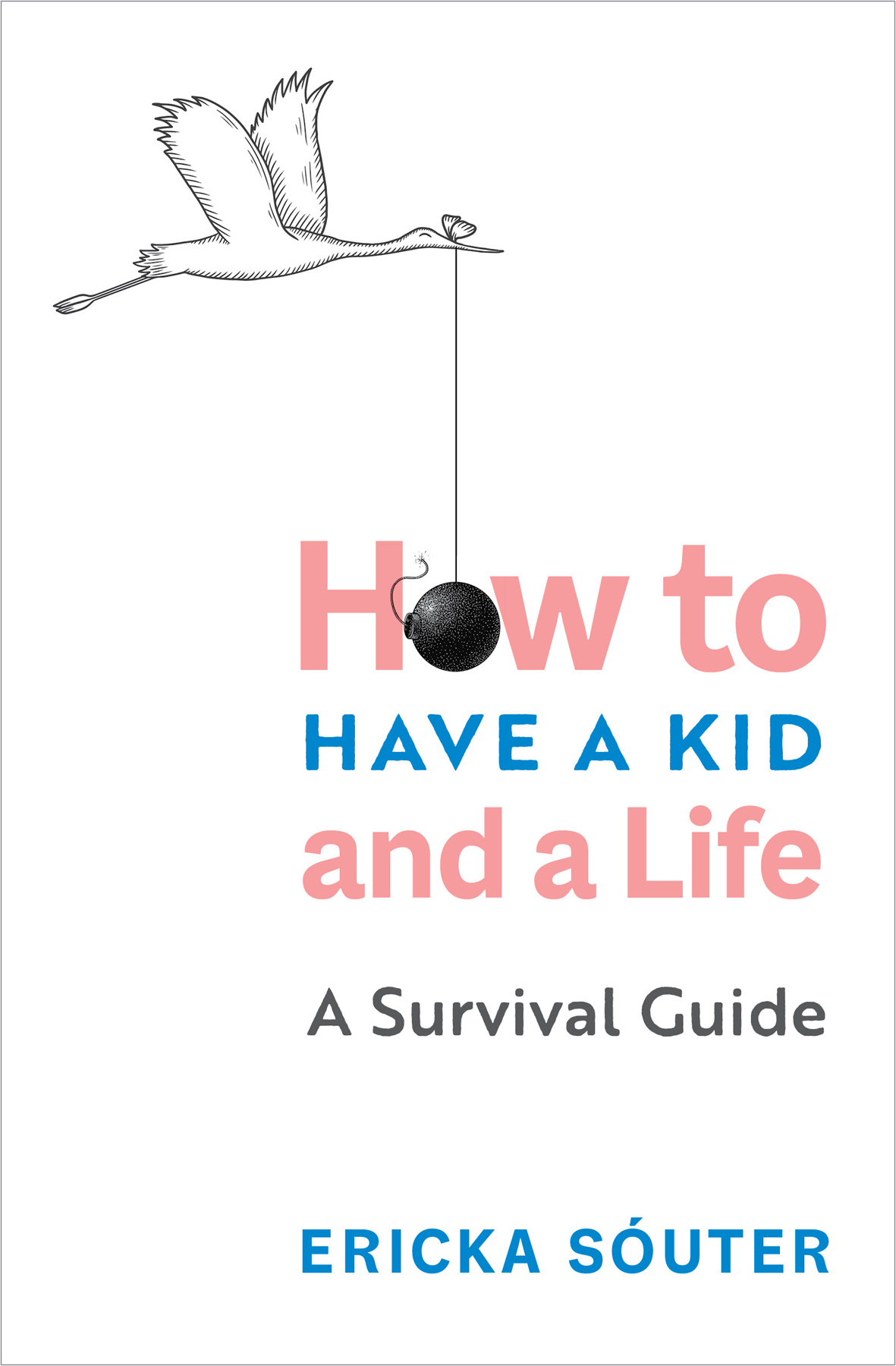

To Caleb:
The most loving, supportive, and patient husband a person can have.
To Lex and Aidan:
Being your mom has changed me in ways I never imagined. Its a privilege to love you, care for you, and have lightsaber battles with you.
To my mother Anita, grandmother Ethel, and aunts Debbie, Nancy, and Annie:
Thank you for teaching me how to be a strong, determined, resilient, and loving woman.
CONTENTS
Introduction
A Reintroduction to Motherhood: The Baby Isnt the Only Newborn in Your House
I dont think I have the mom gene, I used to tell friends with a laugh after a particularly tough day of being chauffeur, chef, hairstylist, laundress, maid, boo-boo healer, referee, mediator, homework helper, birthday organizer, and everything else motherhood entails. While I passed it off as a joke, I really did wonder if I was cut out for this. Was it this hard for everyone? Other women seemed so much more together. I couldnt figure out how to manage it all work, marriage, kids, breathing room. I felt lost. So when I came across research suggesting that there was an actual mom gene, I became obsessed with the idea. Then an editor at CafeMom, I wrote an essay asking if the discovery of a mom gene could be the reason some of us find motherhood so hard. Could it be that some of us are better at it because of biology? It really resonated with readers. So many had been struggling. Many more than I realized. It sparked conversations, not just about being maternal but also about all the other unspoken challenges of motherhood. That is when I knew I wanted to write this book.
Like so many first-time moms, I was under the nave impression that living with a newborn would be the hardest adjustment to parenthood. After all, as soon as you announce that you are expecting, everyone who has ever been within five feet of a baby bombards you with warnings about sleep schedules, colic, and my personal fave, never being able to pee in peace again. Its all well-meaning, of course, but its far from the complete truth. In those first several months, you will learn that the turbulence of life with a baby is not actually the toughest part of your newly minted mommy status.
I have had the great fortune to spend hundreds of hours talking to mothers across the country from different racial, ethnic, religious, and socioeconomic backgrounds. Some longed to be moms their entire lives. Others debated whether it was something they wanted up until the day they found themselves staring at those two lines on a pregnancy test. No matter their path to parenthood, they all shared one universal truth: what they desperately wanted and could not find were real, meaningful discussions about the confidence-shaking, anxiety-causing, what-the-hell-happened-to-me, and why-doesnt-anyonesee-me-anymore reality of becoming a mother.
Before our blessed bundles arrive, our lives are filled with complications from work, romance, friendships, self-image, and much more. These issues become even more complex once kids are in the picture. New moms deal with everything from a sudden friction in their marriages to grown-up mean girls to navigating full-time careers alongside more-than-full-time motherhood. Perhaps Adrienne Rich captured it best in Of Woman Born:
No one mentions that psychic crisis of bearing a first child, the excitation of long-buried feelings about ones own mother, the sense of confused power and powerlessness, or being taken over on the one hand and of touching new physical and psychic potentialities on the other, a heightened sensibility which can be exhilarating, bewildering and exhausting.
Its enough to push you to the brink, but Im here to tell you it doesnt have to. We just need to change the way we think and talk about motherhood. You see, when you become a mom, you are not just giving birth to a baby. A new you emerges as well. And it can feel like a seismic change. In fact, back in 1973 medical anthropologist Dana Raphael (who coined the term doula) named this life shift matrescence. Sounds like adolescence, and thats not by accident. According to Raphael, matrescence is like experiencing puberty all over again.
I turned to Dr. Aurlie Athan, a reproductive psychologist and Columbia University professor who has dedicated her lifes work to this subject, for a deeper understanding. She was looking at the psychology of women over a life span, which meant taking a look at how life-welcoming events like having a child affect us. Women were telling me about the good, the bad, the ugly, and the beautiful, she effused. And they were telling me a lot about growth experiences, in the way they were stretched and deepened. They were telling me this was the most crippling and rewarding experience, both at the same time. It was apparent that motherhood was two sides of the same coin. One superb, one savage.
We have been conditioned to think a woman becomes a mother as soon as she gives birth. Of course, thats biologically true, but its nowhere near as simple as that. Shifting from autonomous human to mom is more akin to a journey rather than one signifying event. And like puberty, it can be awkward, ugly, and uncomfortable. Your body changes, you get pimples and stretch marks. You are moody, emotional, and easily irritated. It even mimics the relationships of adolescence in the sense that social dynamics change, people drop out of your life, and loyalties realign. Sounds fun, right? Dont worry, you will survive. In fact, you will love it if you know what to expect.
This transition to motherhood is different for every woman, according to Dr. Athan. In that sense, there is no exact beginning and no exact end point. The start for each of us is what she calls the oh shit moment. Its the point when motherhood becomes real for you. For some, it could be the moment that all ten of those pregnancy tests youve peed on say positive or the first time you feel those quickening flutters in your pregnant belly. For Connecticut mom of two Natalie, it happened the second after her first baby was born. I felt for the first time in my life I was in the right place, gushed the writer, who blogs about motherhood and mental health at NatsNextAdventure.com. It felt so peaceful. I was her mom. That feeling doesnt always happen right away. It didnt hit Tomika, a single mom from Virginia, until weeks after her son was placed in her arms. Her parents had been with her in the beginning, and this helped smooth the start of motherhood, but when they left, it dawned on her that this was real. Her life would never be the same. She and only she was responsible for this babys survival.
What follows for each of us is a roller coaster in the truest sense. There are times you will be fraught but then rebound only to find yourself completely crazed again. This is the reason we can feel so much disorientation in those early days. And this process gets reawakened with every child and at every developmental stage because mothering a newborn requires a different set of skills than dealing with a preteen or a young adult. We are constantly evolving, learning, and getting little shell shocks along the way. When I explain the concept of matrescence to moms, the first question is usually, How do I avoid it? Sorry. No escaping this one, but being aware of whats ahead will make you feel a lot less crazy. Trust me.
One of the most common ways we respond to the ups and downs of motherhood is by giving more of ourselves more time, more attention, more involvement, more, more, and more. Many of us forego our own passions and interests, our own friends, our own lives. And this, we are told, is the way its supposed to be. Even for those of us who return to work outside the home.


